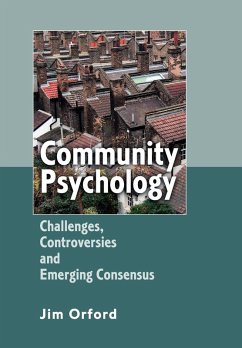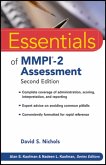Jim Orford (UK University of Birmingham)
Community Psychology
Challenges, Controversies and Emerging Consensus
Jim Orford (UK University of Birmingham)
Community Psychology
Challenges, Controversies and Emerging Consensus
- Broschiertes Buch
- Merkliste
- Auf die Merkliste
- Bewerten Bewerten
- Teilen
- Produkt teilen
- Produkterinnerung
- Produkterinnerung
Community psychology is the branch of psychology concerned with person-environment interactions, and how society impacts upon individual and community functioning. More interventionist than sociology, it is about understanding people within their social worlds and using that knowledge to improve their well-being.
Andere Kunden interessierten sich auch für
![Staring at the Sun Staring at the Sun]() Irvin D. YalomStaring at the Sun22,99 €
Irvin D. YalomStaring at the Sun22,99 €![Practicing Positive Psychology Coaching Practicing Positive Psychology Coaching]() Robert Biswas-Diener (Meridian Life Coaching, LLC, Portland, OregonPracticing Positive Psychology Coaching66,99 €
Robert Biswas-Diener (Meridian Life Coaching, LLC, Portland, OregonPracticing Positive Psychology Coaching66,99 €![The Psychology of Interrogations and Confessions The Psychology of Interrogations and Confessions]() Gudjonsson, Gisli H., CBE (Institute of Psychiatry, King's College,The Psychology of Interrogations and Confessions73,99 €
Gudjonsson, Gisli H., CBE (Institute of Psychiatry, King's College,The Psychology of Interrogations and Confessions73,99 €![Play Therapy with Traumatized Children Play Therapy with Traumatized Children]() Paris Goodyear-BrownPlay Therapy with Traumatized Children66,99 €
Paris Goodyear-BrownPlay Therapy with Traumatized Children66,99 €![Offending Behaviour Programmes Offending Behaviour Programmes]() Emma J. Palmer (University of Leicester)Offending Behaviour Programmes73,99 €
Emma J. Palmer (University of Leicester)Offending Behaviour Programmes73,99 €![Understanding Drugs and Behaviour Understanding Drugs and Behaviour]() Andrew Parrott (UK University of Wales Swansea)Understanding Drugs and Behaviour51,99 €
Andrew Parrott (UK University of Wales Swansea)Understanding Drugs and Behaviour51,99 €![Essentials of Mmpi-2 Assessment Essentials of Mmpi-2 Assessment]() David S. Nichols (Pacific University, Forest Grove, OR)Essentials of Mmpi-2 Assessment60,99 €
David S. Nichols (Pacific University, Forest Grove, OR)Essentials of Mmpi-2 Assessment60,99 €-
-
-
Community psychology is the branch of psychology concerned with person-environment interactions, and how society impacts upon individual and community functioning. More interventionist than sociology, it is about understanding people within their social worlds and using that knowledge to improve their well-being.
Hinweis: Dieser Artikel kann nur an eine deutsche Lieferadresse ausgeliefert werden.
Hinweis: Dieser Artikel kann nur an eine deutsche Lieferadresse ausgeliefert werden.
Produktdetails
- Produktdetails
- Verlag: John Wiley & Sons Inc
- Seitenzahl: 488
- Erscheinungstermin: 11. Januar 2008
- Englisch
- Abmessung: 244mm x 170mm x 26mm
- Gewicht: 846g
- ISBN-13: 9780470855942
- ISBN-10: 0470855940
- Artikelnr.: 22896776
- Herstellerkennzeichnung
- Libri GmbH
- Europaallee 1
- 36244 Bad Hersfeld
- gpsr@libri.de
- Verlag: John Wiley & Sons Inc
- Seitenzahl: 488
- Erscheinungstermin: 11. Januar 2008
- Englisch
- Abmessung: 244mm x 170mm x 26mm
- Gewicht: 846g
- ISBN-13: 9780470855942
- ISBN-10: 0470855940
- Artikelnr.: 22896776
- Herstellerkennzeichnung
- Libri GmbH
- Europaallee 1
- 36244 Bad Hersfeld
- gpsr@libri.de
Professor Jim Orford, University of Birmingham, UK
About the Author.
Preface.
Acknowledgements.
PART I. THE BACKGROUND TO COMMUNITY PSYCHOLOGY AND WHAT IT STANDS FOR.
1. Challenging Psychology Over its Neglect of the Social.
The individualism of psychology.
The new public health psychology.
Critical psychology.
2. Community Psychology's Core Values: Empowerment, Liberation and Social
Justice.
Empowerment.
Social constructionism and its critics.
Liberation psychology.
Social justice as a core value.
3. The Debate over Knowledge in Community Psychology.
Dissatisfaction with existing research methods.
Support for qualitative research.
Participatory and action research.
Negotiating the community psychology researcher's role.
What kind of science is community psychology?
PART II. UNDERSTANDING INEQUALITY AND ITS EFFECTS ON HEALTH.
4. Social Position and Inequalities in Health.
The accumulation of evidence that health is related to social position.
Social class': complexities and controversies.
Inequality of income distribution.
Psychosocial versus material explanations.
5. Place and its Influence on Health and Well-being.
Evidence for the influence of area on health and well-being.
How neighbourhoods may (fail to) meet local health needs.
6. Two Concepts for Understanding Inequalities by Position and Place.
Social capital.
Sense of community.
PART III. THE EXPERIENCE OF DISEMPOWERMENT: SEVEN EXAMPLES.
7. Disempowerment by War, Immigration, Homelessness or Unemployment.
Communities caught up in war and its consequences.
Groups of people adjusting to a new country.
Experiencing homelessness.
The unemployed and the under-employed.
8. Disempowered Because of Income, Gender, or Sexual Orientation.
The poor and socially excluded.
Women.
Lesbian, gay, bisexual and transgendered people.
PART IV. COMMUNITY PSYCHOLOGY ACTION: FROM SUPPORT TO LIBERATION.
9. Strengthening Social Support for Members of Disempowered Groups.
Social support for young people.
Social support interventions for women.
Support for those with illness or disability or for their families.
Responding to domestic violence.
Support for LGBT groups.
10. Social Action and Innovation.
Moving to collective social action.
Experimental social innovation and dissemination.
11. Empowering Communities.
The theory of community coalitions.
Collaborations, consortia and coalitions: examples of projects.
Young people and collective action.
12. Participation and Liberation.
Participation in local action.
Drawing on a diversity of world views.
Projects to protect and sustain natural resources.
Towards liberation for the poor and oppressed.
Finale - Consensus and Challenge.
References.
Author Index.
Subject Index.
Preface.
Acknowledgements.
PART I. THE BACKGROUND TO COMMUNITY PSYCHOLOGY AND WHAT IT STANDS FOR.
1. Challenging Psychology Over its Neglect of the Social.
The individualism of psychology.
The new public health psychology.
Critical psychology.
2. Community Psychology's Core Values: Empowerment, Liberation and Social
Justice.
Empowerment.
Social constructionism and its critics.
Liberation psychology.
Social justice as a core value.
3. The Debate over Knowledge in Community Psychology.
Dissatisfaction with existing research methods.
Support for qualitative research.
Participatory and action research.
Negotiating the community psychology researcher's role.
What kind of science is community psychology?
PART II. UNDERSTANDING INEQUALITY AND ITS EFFECTS ON HEALTH.
4. Social Position and Inequalities in Health.
The accumulation of evidence that health is related to social position.
Social class': complexities and controversies.
Inequality of income distribution.
Psychosocial versus material explanations.
5. Place and its Influence on Health and Well-being.
Evidence for the influence of area on health and well-being.
How neighbourhoods may (fail to) meet local health needs.
6. Two Concepts for Understanding Inequalities by Position and Place.
Social capital.
Sense of community.
PART III. THE EXPERIENCE OF DISEMPOWERMENT: SEVEN EXAMPLES.
7. Disempowerment by War, Immigration, Homelessness or Unemployment.
Communities caught up in war and its consequences.
Groups of people adjusting to a new country.
Experiencing homelessness.
The unemployed and the under-employed.
8. Disempowered Because of Income, Gender, or Sexual Orientation.
The poor and socially excluded.
Women.
Lesbian, gay, bisexual and transgendered people.
PART IV. COMMUNITY PSYCHOLOGY ACTION: FROM SUPPORT TO LIBERATION.
9. Strengthening Social Support for Members of Disempowered Groups.
Social support for young people.
Social support interventions for women.
Support for those with illness or disability or for their families.
Responding to domestic violence.
Support for LGBT groups.
10. Social Action and Innovation.
Moving to collective social action.
Experimental social innovation and dissemination.
11. Empowering Communities.
The theory of community coalitions.
Collaborations, consortia and coalitions: examples of projects.
Young people and collective action.
12. Participation and Liberation.
Participation in local action.
Drawing on a diversity of world views.
Projects to protect and sustain natural resources.
Towards liberation for the poor and oppressed.
Finale - Consensus and Challenge.
References.
Author Index.
Subject Index.
About the Author.
Preface.
Acknowledgements.
PART I. THE BACKGROUND TO COMMUNITY PSYCHOLOGY AND WHAT IT STANDS FOR.
1. Challenging Psychology Over its Neglect of the Social.
The individualism of psychology.
The new public health psychology.
Critical psychology.
2. Community Psychology's Core Values: Empowerment, Liberation and Social
Justice.
Empowerment.
Social constructionism and its critics.
Liberation psychology.
Social justice as a core value.
3. The Debate over Knowledge in Community Psychology.
Dissatisfaction with existing research methods.
Support for qualitative research.
Participatory and action research.
Negotiating the community psychology researcher's role.
What kind of science is community psychology?
PART II. UNDERSTANDING INEQUALITY AND ITS EFFECTS ON HEALTH.
4. Social Position and Inequalities in Health.
The accumulation of evidence that health is related to social position.
Social class': complexities and controversies.
Inequality of income distribution.
Psychosocial versus material explanations.
5. Place and its Influence on Health and Well-being.
Evidence for the influence of area on health and well-being.
How neighbourhoods may (fail to) meet local health needs.
6. Two Concepts for Understanding Inequalities by Position and Place.
Social capital.
Sense of community.
PART III. THE EXPERIENCE OF DISEMPOWERMENT: SEVEN EXAMPLES.
7. Disempowerment by War, Immigration, Homelessness or Unemployment.
Communities caught up in war and its consequences.
Groups of people adjusting to a new country.
Experiencing homelessness.
The unemployed and the under-employed.
8. Disempowered Because of Income, Gender, or Sexual Orientation.
The poor and socially excluded.
Women.
Lesbian, gay, bisexual and transgendered people.
PART IV. COMMUNITY PSYCHOLOGY ACTION: FROM SUPPORT TO LIBERATION.
9. Strengthening Social Support for Members of Disempowered Groups.
Social support for young people.
Social support interventions for women.
Support for those with illness or disability or for their families.
Responding to domestic violence.
Support for LGBT groups.
10. Social Action and Innovation.
Moving to collective social action.
Experimental social innovation and dissemination.
11. Empowering Communities.
The theory of community coalitions.
Collaborations, consortia and coalitions: examples of projects.
Young people and collective action.
12. Participation and Liberation.
Participation in local action.
Drawing on a diversity of world views.
Projects to protect and sustain natural resources.
Towards liberation for the poor and oppressed.
Finale - Consensus and Challenge.
References.
Author Index.
Subject Index.
Preface.
Acknowledgements.
PART I. THE BACKGROUND TO COMMUNITY PSYCHOLOGY AND WHAT IT STANDS FOR.
1. Challenging Psychology Over its Neglect of the Social.
The individualism of psychology.
The new public health psychology.
Critical psychology.
2. Community Psychology's Core Values: Empowerment, Liberation and Social
Justice.
Empowerment.
Social constructionism and its critics.
Liberation psychology.
Social justice as a core value.
3. The Debate over Knowledge in Community Psychology.
Dissatisfaction with existing research methods.
Support for qualitative research.
Participatory and action research.
Negotiating the community psychology researcher's role.
What kind of science is community psychology?
PART II. UNDERSTANDING INEQUALITY AND ITS EFFECTS ON HEALTH.
4. Social Position and Inequalities in Health.
The accumulation of evidence that health is related to social position.
Social class': complexities and controversies.
Inequality of income distribution.
Psychosocial versus material explanations.
5. Place and its Influence on Health and Well-being.
Evidence for the influence of area on health and well-being.
How neighbourhoods may (fail to) meet local health needs.
6. Two Concepts for Understanding Inequalities by Position and Place.
Social capital.
Sense of community.
PART III. THE EXPERIENCE OF DISEMPOWERMENT: SEVEN EXAMPLES.
7. Disempowerment by War, Immigration, Homelessness or Unemployment.
Communities caught up in war and its consequences.
Groups of people adjusting to a new country.
Experiencing homelessness.
The unemployed and the under-employed.
8. Disempowered Because of Income, Gender, or Sexual Orientation.
The poor and socially excluded.
Women.
Lesbian, gay, bisexual and transgendered people.
PART IV. COMMUNITY PSYCHOLOGY ACTION: FROM SUPPORT TO LIBERATION.
9. Strengthening Social Support for Members of Disempowered Groups.
Social support for young people.
Social support interventions for women.
Support for those with illness or disability or for their families.
Responding to domestic violence.
Support for LGBT groups.
10. Social Action and Innovation.
Moving to collective social action.
Experimental social innovation and dissemination.
11. Empowering Communities.
The theory of community coalitions.
Collaborations, consortia and coalitions: examples of projects.
Young people and collective action.
12. Participation and Liberation.
Participation in local action.
Drawing on a diversity of world views.
Projects to protect and sustain natural resources.
Towards liberation for the poor and oppressed.
Finale - Consensus and Challenge.
References.
Author Index.
Subject Index.








